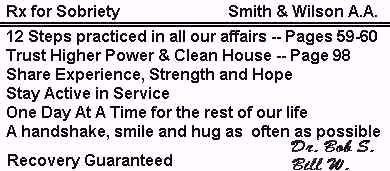

 Click The Images To Go To Page Indicated Whenever a civilization or society declines or perishes there is always one condition present - they forgot where they came from. -- Carl Sandburg
Alcoholics Anonymous, now years old, is the non-organization that has provided the template for every 12-step recovery program that has followed. But there is something different about A.A. meetings now than they were originally ... They have gone soft ... They have forgotten the Basics of Recovery in large measure. (see Gresham's Law & Alcoholics Anonymous - Why Alcoholics Anonymous is not as effective now as it was in prior years.) A radical return to A.A.'s founding spirit and methods is beginning with Back to Basics meetings across the nation, and internationally, with strict adherence to the A.A. principles engendered in the steps and traditions. A.A., it may be observed, has drifted away from its original purpose by allowing alcoholics to take too long to complete the 12 steps, to shy away from spirituality as they try to recover, and to devise their own methods of staying sober. In short, A.A. has gotten wimpy. In Back to Basics meetings, attendees are expected to go through all 12 steps in four one-hour sessions, and they're expected to stick to them. In the meetings there is little talk about the problem and the individual's drinking career. The talk is about God, Spirituality and The Steps. The Steps are begun immediately with none of the one step a year procrastination, with none of the psychobabble inherited from the treatment centers. In most current A.A. meetings, the primary A.A. format is open discussion, where people talk about anything, the "My Dog Died, My Car Wouldn't Start, But I Didn't Drink Over It" meetings. That's about all they talk about. No God. No Steps, and as a result the recovery rates have plummeted from the 75% recovery in early A.A. documented many times, (See Philadelphia Statistics 1941), down to a 5 to 10% permanent recovery rate today. In the forward to the 1955 second edition of Alcoholics Anonymous, there is an estimate that of alcoholics who came and really tried, 50 percent got permanently sober, 25 percent got permanently sober with some relapses, and 25 percent showed improvement. The A.A. Twelve Step Program can be divided into three parts. Steps 1-3 are "Trust God," Steps 4-10 are "Clean House," and Steps 11-12 are "Help Others." It takes action and continued work in all three parts for a person to get sober and stay sober. With the return to Back to Basics and the original A.A. program as practiced in the 1940s identical results as noted in the BigBook, are being seen today in these meetings, with three out of four members achieving permanent sobriety. Back to Basics members say the program works for them because it gives them practical ways to stay sober and fewer excuses for failing. In most current A.A. meetings, the primary A.A. format is open discussion, where people talk about anything, the "My Dog Died, My Car Wouldn't Start, But I Didn't Drink Over It" meetings. That's about all they talk about. No God. No Steps, and as a result the recovery rates have plummeted from the 75% recovery in early A.A. documented many times, (See Philadelphia Statistics 1941), down to a 5 to 10% permanent recovery rate today. In the forward to the 1955 second edition of Alcoholics Anonymous, there is an estimate that of alcoholics who came and really tried, 50 percent got permanently sober, 25 percent got permanently sober with some relapses, and 25 percent showed improvement. The A.A. Twelve Step Program can be divided into three parts. Steps 1-3 are "Trust God," Steps 4-10 are "Clean House," and Steps 11-12 are "Help Others." It takes action and continued work in all three parts for a person to get sober and stay sober. With the return to Back to Basics and the original A.A. program as practiced in the 1940s identical results as noted in the BigBook, are being seen today in these meetings, with three out of four members achieving permanent sobriety. "I went drinking and relapsed four times in the last couple of years," said one member, "I just didn't catch on in the regular A.A. meetings. In Back to Basics meetings everything is much more clear than at the other meetings, where people just sit around bitching, whining, crying and sniveling. The difference is in bringing people back to the Spiritual Solution, not the psychological solution. In many A.A. meetings today they don't talk about God. They now conduct group therapy meetings, not A.A. meetings. Of course, any individual is free to pursue the principles of A.A. however they want. There really isn't any doctrine that A.A. members need to follow. Back to Basics members are people who would like to present the original program to the newcomer, versus the people who have been through treatment centers and want a godless A.A. The treatment center version "I am the center of the universe, and I can overcome alcoholism based on self will," is directly opposed to the original A.A. concept that we surrender our lives to God, not necessarily a "Religious" God of any religion or philosophy, but "God as you understand God." One Back to Basics group is surrounded by the typical meeting signs, one with the 12 steps, one the 12 traditions, and two that are unique to this meeting. One, nailed to a log says, "Alcoholism is the 2x4 God used to get our attention." The other says, "The Big Book was designed to change the alcoholic, not the other way around." Another group has this sign, "If you are too busy for A.A., perhaps you are too busy." The Big Book is the basic text of A.A. It outlines A.A.'s philosophy, methods and the 12 steps. It continues to be the basis of all A.A. meetings including Back to Basics meetings where the principles of A.A., the 12 Steps, are more emphatic. Back to Basics meetings lay out the steps of the program in "beginners" meetings as was done in the original meetings of A.A. In these sessions new members go through the 12 steps in four weeks. In the first meeting, people admit they have alcohol or drug addictions. In the following three, they complete the remaining 11 steps by doing "homework." By the end of the fourth meeting, recovering alcoholics are ready to sponsor newcomers at their fifth meeting. In Back to Basics meetings, the sessions are perfunctory. There is little idle chatter or spontaneous sharing. The two meeting leaders at the front table read from the BigBook and the Steps. When they're finished, there is a short discussion of the practical application of the reading to attain the solution, and the meeting ends. "I have two months of sobriety," one member said, explaining that she has attended three meetings a day, both Back to Basics meetings and regular discussion meetings, since she decided to become sober nine weeks ago. Getting Back to Basics has given her the blueprint and the understanding for getting sober more quickly. "I don't want to wait four years to unload all this baggage." Back to Basics is still all about, "Changing the world -- one life at a time," providing once again the message of hope to countless, still-suffering alcoholics, both inside and outside the rooms of A.A.
One of the most powerful and hope-filled statements to be found in the entire text of Alcoholics Anonymous can be found on pages 25 and 26.
The 12 Steps of A.A.
Index of A.A. History Pages on Barefoot's Domain As in so many things, especially with we alcoholics, our History is our Greatest Asset!.. We each arrived at the doors of A.A. with an intensive and lengthy "History of Things That Do Not Work" .. Today, In A.A. and In Recovery, Our History has added an intensive and lengthy "History of Things That DO Work!!" and We will not regret the past nor wish to shut the door on it!!
KEEP COMING BACK!
On the Web Oct 20, 2002 in the Spirit of Cooperation Three mighty important things, Pardn'r, LOVE And PEACE and SOBRIETY |


